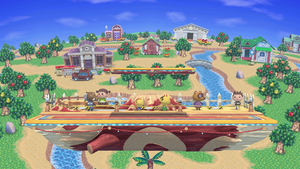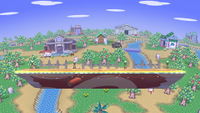Smashville: Difference between revisions
mNo edit summary |
(→Trivia) |
||
| Line 141: | Line 141: | ||
*In {{forwiiu}}, the [[Boxing Ring]] stage lists the [[Villager (SSB4)|Villager]]'s character title as "Mayor of Smashville", a reference to this stage. | *In {{forwiiu}}, the [[Boxing Ring]] stage lists the [[Villager (SSB4)|Villager]]'s character title as "Mayor of Smashville", a reference to this stage. | ||
*This is the only past stage in {{forwiiu}} that does not use normal [[crates]]. | *This is the only past stage in {{forwiiu}} that does not use normal [[crates]]. | ||
*Despite taking several design cues from [[Animal Crossing: Wild World]], the stage's game of origin was changed from Animal Crossing: Wild World to [[Animal Crossing]] in [[Super Smash Bros. for Wii U]] and [[Super Smash Bros. Ultimate]]. | |||
== External links == | == External links == | ||
Revision as of 15:05, August 12, 2018
| Smashville | |
|---|---|
 Smashville in Super Smash Bros. Ultimate. 
| |
| Universe | Animal Crossing |
| Appears in | Brawl SSB4 (Wii U) Ultimate |
| Availability | Starter (Brawl and Ultimate) Unlockable (SSB4) |
| Unlock criteria | Clear the Playing Tricks event. |
| Crate type | Presents |
| Maximum players | 8 |
| Tracks available | In Brawl: Title (Animal Crossing) Go K.K. Rider! 2:00 a.m. Town Hall and Tom Nook's Store The Roost Bolded track must be unlocked K.K. Slider tracks: K.K. Cruisin' K.K. Condor K.K. Western K.K. Gumbo Rockin' K.K. DJ K.K. In SSB4: Title (Animal Crossing) Tortimer Island Medley Go K.K. Rider! 2:00 a.m. Town Hall and Tom Nook's Store The Roost (Animal Crossing: Wild World) |
| Article on Nookipedia | Town |
Smashville (すま村, Smash Village) is a stage in Super Smash Bros. Brawl, Super Smash Bros. for Wii U and Super Smash Bros. Ultimate based on the Animal Crossing franchise. Players battle on a platform with a moving horizontal jump-through platform suspended above an Animal Crossing town while spectators watch on.
Stage Description
Smashville's only dynamic element is a floating soft platform that moves from side to side over the stage.
The stage is home to numerous background characters from the Animal Crossing series, and features a day-night cycle that runs according to the console's internal clock. On Saturday evenings from 8:00 PM to 12:00 AM, K.K. Slider will appear in the background performing a concert. Other background characters spectate the fight, reacting to KOs and visibly favoring one fighter or another.
Small, red balloons sometimes float overhead, carrying food items if they are enabled (even if the overall item frequency is set to "none"). The balloons can be popped with one hit. Moves that change once hitting a hurtbox will interact with the balloons, such as Bouncing Fish.
Ω form
The moving platform, background characters, and balloons do not appear in the Ω form. Additionally, the stage is increased in length somewhat to match that of Final Destination.
Tournament Legality
In Brawl this stage is a starter in tournaments because of its simple layout and lack of stage hazards. It is one of the three Brawl stages legal in Japan; the others are Battlefield and Final Destination.
The 2017 recommended ruleset for SSB4 also lists this stage as a starter in tournaments, for the same reasons as in Brawl.
Background Characters
The following characters appear in the background of Smashville:
- Blathers
- Booker (always)
- Brewster
- Celeste
- Copper (always)
- Cornimer
- Crazy Redd
- Dr. Shrunk
- Gracie
- Gulliver (in the crowd and flying in his UFO)
- Harriet
- Human Boy (One of which bearing a resemblance to Villager)
- Human Girl
- Kapp'n (in the crowd and driving his taxi to the town hall)
- Katie & Kaitlin
- Katrina
- Lyle
- K.K. Slider (on Saturdays at 8 PM, the same night settings of Animal Crossing)
- Mabel
- Pascal
- Pelly
- Pete (Flying in the background)
- Phyllis
- Rover
- Sable
- Saharah
- Sow Joan
- Timmy
- Tommy
- Tom Nook
- Tortimer
- Wendell
Origin
In 2001, a Japanese Nintendo 64 game called Animal Forest was released, which is the first game in the Animal Crossing franchise. Animal Forest was translated, and ported to the GameCube as Animal Crossing (also known as Animal Crossing: Population Growing) with some added features, such as the Able Sisters building and the Museum. As Animal Forest is the first Animal Crossing game, the GameCube version is a remake of the same game.
Each Animal Crossing game is mostly set in a small town. A typical town can be seen in the background of this stage. Here are all the buildings that appear in the background:
| Building | Origin Game | Purpose |
|---|---|---|
| Able Sisters | Animal Crossing | Design patterns for shirts and umbrellas, which the player can then wear or trade. |
| Animal Villager Houses | Animal Crossing (design from Wild World) | Residence of the non-playable villager characters. |
| Museum | Animal Crossing | Where the player can donate their bugs, fish, paintings, and fossils that they got for viewing. |
| Player's House | Animal Crossing (design from Wild World) | Residence of the player who can buy furniture, wallpaper, and floor designs for the interior. |
| Town Hall | Animal Crossing: Wild World | Where the player pays off his or her debt to Tom Nook, reports other villagers, send mail etc. |
Strangely, despite Tom Nook's stores being one of the most important buildings in the Animal Crossing universe, not one version can be seen in this stage.
In the beginning of Wild World a turtle named Kapp'n drives the player to the town in a taxi. This taxi can be seen driving across town to the town hall. The town itself in Smash retains almost everything that can be seen in a town in the Animal Crossing series such as trees, rocks, flowers, a river, bridges, a waterfall (however, this can only be seen with the use of a hacked camera, or by the Demon moving the camera), etc. In Wild World, in the museum there is an observatory. A player can go in the observatory and talk to an owl named Celeste who lets the player either stargaze or make constellations. The player could make a constellation however he or she wants it to look like. The constellations can also be seen outside for everybody to see. In this stage, the night sky features some constellations.
In Animal Crossing there are balloons that float over town carrying a present. The player must wait and see if the balloon will get caught in a tree. If the balloon does get caught in a tree, the player can shake the tree which makes the present fall down. In Animal Crossing: Wild World there are still balloons that float over the town, but now the player has a chance to buy a slingshot to pop the balloons and have the present fall. It seems the balloons that carry food in this stage is more of a reference to the balloons in Wild World due to the player being able to pop the balloon. In Wild World an Gulliver, a seagull astronaut flies through the town in a flying saucer. He can also be shot down with the use of the slingshot. In the background of this stage Gulliver can occasionally be seen flying his ship across the town. In both Animal Crossing and Wild World there is a Pelican named Pete who delivers the mail across town. Pete can be seen flying across the town in the background of this stage.
There are numerous characters seen in the background of the main platform, all which have appeared in Wild World (while some originate in Animal Crossing). In Animal Crossing there is a dog named K.K. Slider (also known as Totakeke). He is a musician who appears at the train station every Saturday at 8:00 PM. If the player talks to K.K. Slider, the player can either request a song or ask him to play a random song. In Smash, if the player plays on this stage from 8:00 PM onwards on a Saturday, K.K. Slider can be seen and heard playing one of his songs. In the Animal Crossing games, K.K. Slider will only be performing until 9:00 PM, but in Smash, he will play until midnight. The songs that K.K. Slider plays on this stage are real songs that he plays in the Animal Crossing games. In Wild World a pigeon named Brewster owns a café named The Roost. Both Brewster and a portable version of The Roost cafe can occasionally be seen. In Animal Crossing there is a giraffe named Gracie, who is a celebrity fashion designer who appears occasionally in a town. She also owns a red convertible car. In Wild World she owns a yellow car that has a roof. In this stage, Gracie can be seen watching the fight or driving her yellow car.
Gallery
Smashville in Super Smash Bros. for Wii U.
Update history
- Added 8-player mode version of the stage and altered existing Ω form to support 8 players (from 6).
Trivia
- The name "Smashville" takes advantage of the fact that, in the Animal Crossing series, players can name their own town, so it is named after the name of the game.
- Incidentally, it is impossible to name a town "Smashville" in any Animal Crossing game, as "Smashville" is ten letters long, and the maximum number of characters allowed is eight.
- The Japanese name of the stage, すま村 (Sumamura), is a pun on スマブラ (Sumabura), a Japanese abbreviation of "Smash Bros."
- If the player watches Kapp'n's taxi, after stopping at the town hall, it drives into a tree. It stays there for a few seconds before restarting the cycle.
- The Town Hall clock shows the actual time from the the console's internal clock.
- The sign in front of the Able Sister's shop was never translated; it is still in its original Japanese text in French.
- If owls Blathers or Celeste are present in the background during the day, they will be asleep.
- In Super Smash Bros. for Wii U, the Boxing Ring stage lists the Villager's character title as "Mayor of Smashville", a reference to this stage.
- This is the only past stage in Super Smash Bros. for Wii U that does not use normal crates.
- Despite taking several design cues from Animal Crossing: Wild World, the stage's game of origin was changed from Animal Crossing: Wild World to Animal Crossing in Super Smash Bros. for Wii U and Super Smash Bros. Ultimate.
External links
|
| |
|---|---|
| Fighters | Villager (SSB4 · SSBU) · Isabelle (SSBU) |
| Assist Trophies | Mr. Resetti · Isabelle · Kapp'n |
| Stages | Smashville · Tortimer Island · Town and City |
| Items | Pitfall · Beehive |
| Other | K.K. Slider · Lloid · Timmy & Tommy · Tom Nook |
| Trophies, Stickers and Spirits | Trophies (SSBB · SSB4) · Stickers · Spirits |
| Music | Brawl · SSB4 · Ultimate |







